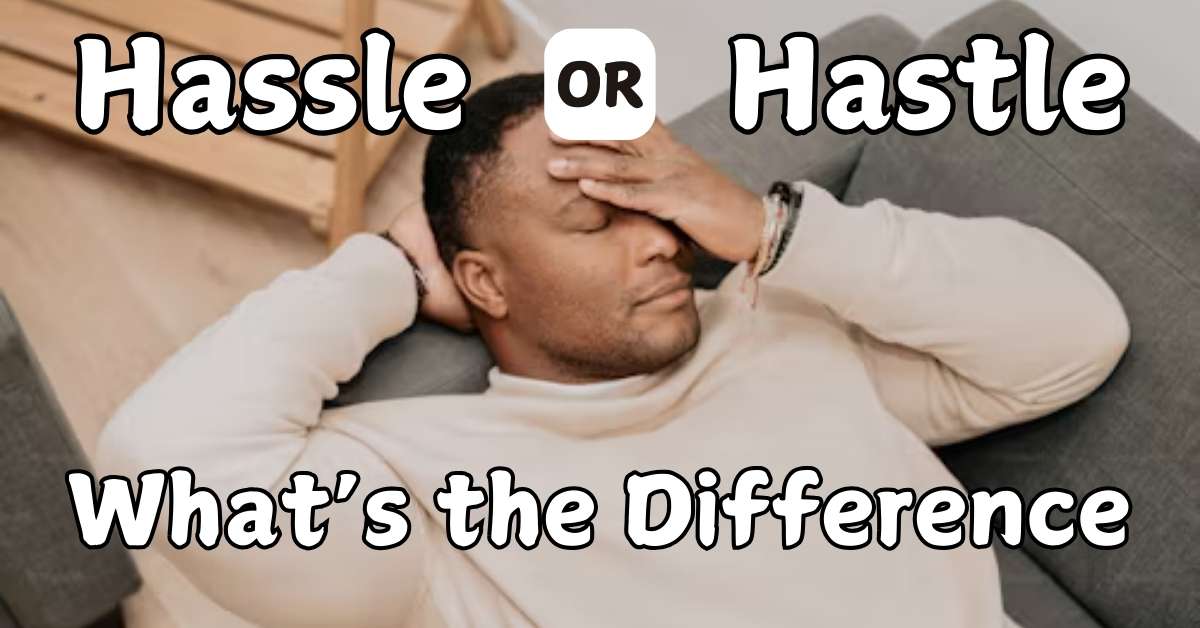Hassle or Hastle can often lead to confusion for many English speakers. While both terms may sound similar, only one holds a recognized meaning in the English language.
Understanding the difference between these two words is essential for clear communication and effective writing. Hassle refers to annoyances or difficulties that we encounter in our daily lives, while hastle is simply a common misspelling.
In this article, we will explore the definitions, usages, and origins of hassle, helping you avoid common mistakes and enhancing your language skills. By the end, you’ll feel more confident in using the correct spelling and understanding its context in everyday conversations.
Quick Summary
hassle refers to an annoyance or difficulty in daily life. It can describe situations that create stress or minor frustrations. On the other hand, hastle is simply a misspelling with no recognized meaning. Understanding this difference is crucial for anyone looking to master English spelling and grammar.
Understanding Hassle or Hastle

The confusion between hassle and hastle often arises from their phonetic similarity. Both words sound alike, which can lead to mistakes in writing. However, only hassle is the correct term used in English.
This confusion can be particularly common among language learners who may struggle with pronunciation issues or regional accents that affect how words sound.To avoid this confusion, it helps to remember that hassle has a clear definition related to everyday challenges.
In contrast, hastle serves no purpose in the English language. By focusing on the correct spelling and meaning of hassle, you can improve your language accuracy and avoid common errors.
Origins of the Hassle
Hassle first appeared in American English around 1945, noted in “Down Beat” magazine as a term for “fuss” or “trouble.” Its origins are uncertain; it may derive from the Southern dialect meaning “to pant or breathe noisily,” recorded as early as 1928. Alternatively, it could stem from the verb “hatchel,” meaning “to harass,” which itself might relate to “hazel,” the plant used for making switches. By 1946, hassle gained popularity in show business, reflecting everyday frustrations and challenges.
Hassle: Definition and Usage
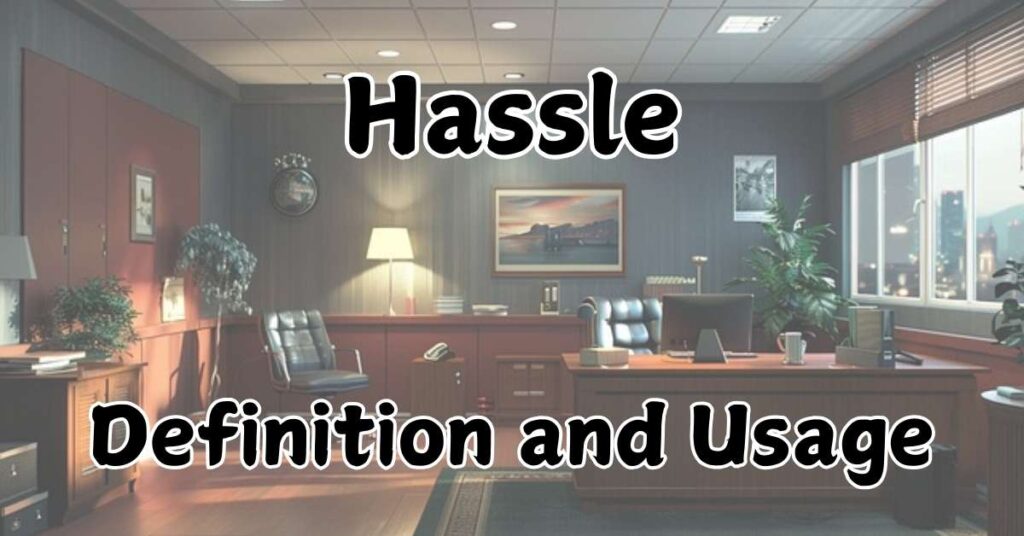
Hassle refers to an annoyance or difficulty that disrupts daily life. It can function as both a noun and a verb. As a noun, it describes frustrating situations, like waiting in long lines.
As a verb, it means to bother or pester someone. Understanding its usage helps improve clarity in communication and writing.
Hassle Meanings
The term hassle can function both as a noun and a verb. As a noun, it describes a situation that is annoying or troublesome. For instance, you might say, “Getting stuck in traffic was a real hassle.” As a verb, it means to annoy or pester someone.
For example, “Please don’t hassle me while I’m working.” Recognizing these different usages will help you apply the word correctly in various contexts.
The Definition of Hassle in Different Contexts
“Hassle” demonstrates versatility, describing annoyances in daily life, relationships, work, and various social situations.
As a Noun: The Concept of a Hassle
Hassle describes an annoying situation or inconvenience that disrupts daily routines. Common examples include traffic jams, missed appointments, or dealing with complicated paperwork that creates stress.
As a Verb: The Act of Hassling
Hassling means to annoy or pester someone persistently. This can occur in various contexts, such as when someone repeatedly interrupts you while you’re trying to focus.
Common Usage of the Word ‘Hassle’ in Sentences
People frequently use hassle in everyday conversations. For instance, one might say, “It’s such a hassle to find parking,” or “Please don’t hassle me while I’m working.”
Using “Hassle” in Writing
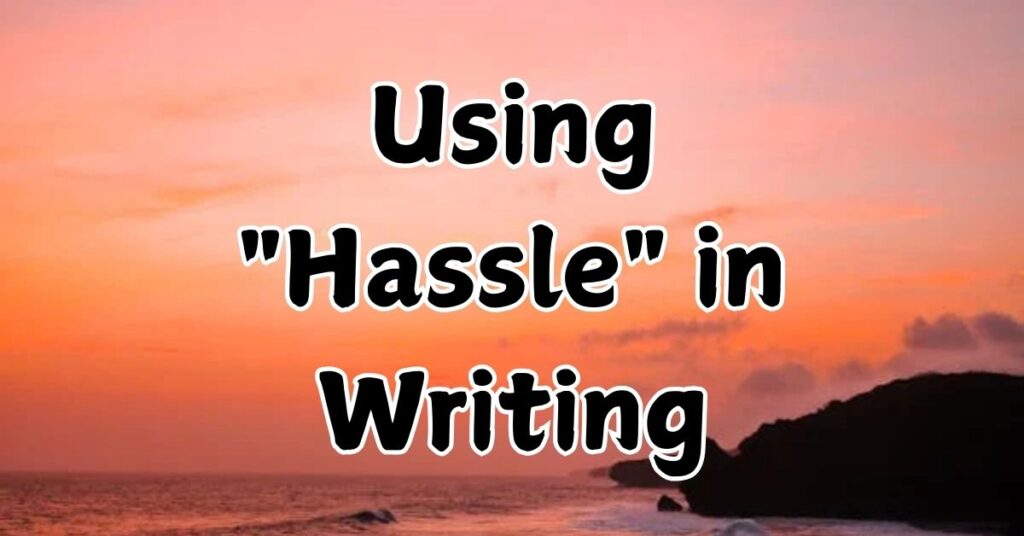
Word hassle into your writing can enhance clarity and relatability. Whether in fiction or nonfiction, it effectively conveys everyday annoyances. For instance, describing a character facing hassles adds depth to their experience.
In essays, using hassle can illustrate challenges in a straightforward manner, making your points more engaging and accessible to readers.
Using In Novels
The term hassle often captures the essence of daily struggles faced by characters. Here are examples:
- “Planning our wedding has turned into a hassle, with endless meetings and decisions.”
- “Every lead I followed came with its own hassle, complicating the case further.”
- “Dealing with schoolwork and social life is such a hassle; I just want some peace.”
- “The quest was filled with unexpected hassles that tested his resolve at every turn.”
- “Living during these times brings its own set of hassles, from food shortages to political unrest.”
Using “Hassle” in Short Stories
Short stories often utilize hassle to convey relatable frustrations in concise narratives. Here are examples:
- “Getting my car fixed was such a hassle; I spent hours waiting at the garage.”
- In another tale, someone expresses, “The hassle of moving to a new city left me feeling overwhelmed and exhausted.”
- “Trying to cook dinner while juggling kids is a daily hassle I didn’t sign up for.”
- “The little hassles of life can sometimes overshadow the joy of simple moments.”
- “Every time I tried to escape this town, another hassle pulled me back.”
Using “Hassle” in Poetry
Poetry often uses hassle to evoke emotions tied to everyday annoyances. Here are examples:
- “Amidst the city’s hustle and bustle, each hassle weighs heavy on my soul.”
- “Life’s little hassles weave through my thoughts like threads of an unending tapestry.”
- “Even in love’s embrace, there are hassles that linger like shadows in the light.”
- “The beauty of dawn breaks through the night’s hassle, promising peace with each new day.”
- “With every step I take on this path of life, I trip over hassles that cause me strife.”
Using “Hassle” in Non-Fiction
Hassle effectively illustrates real-life challenges. Here are examples:
- “Daily hassles can accumulate and lead to significant emotional strain if not addressed.”
- “To achieve goals without hassle, prioritize tasks and eliminate unnecessary distractions.”
- “Choosing all-inclusive resorts can help you enjoy your vacation without any “Managing your budget should be straightforward; avoid hassles by tracking expenses regularly.”
- “Recognizing and minimizing daily hassles can improve your overall quality of life.”
Synonyms of Hassle
Here are ten synonyms for the word hassle:
- Annoyance
- Inconvenience
- Bother
- Trouble
- Irritation
- Difficulty
- Frustration
- Nuisance
- Complication
- Commotion
These synonyms can help convey similar meanings in various contexts.
Hastle: Definition and Usage

Hastle is a common misspelling of the word hassle and does not have any recognized meaning in the English language. While many people mistakenly use hastle in place of hassle, it’s important to remember that only hassle conveys the idea of annoyance or difficulty.
Avoiding this misspelling can enhance your writing clarity and ensure effective communication in both spoken and written English.
Hastle Meanings
Since hastle is not an accepted term in English, it carries no meaning and should be avoided altogether. Instead of using hastle, always opt for hassle when discussing annoyances or difficulties.
Side by Side Comparison
To clarify the differences between these two terms further, here’s a simple comparison:
| Word | Correctness | Meaning | Usage |
| Hassle | ✅ Correct | Annoyance or difficulty | Commonly used |
| Hastle | ❌ Incorrect | No meaning; misspelled | Not used properly |
Everyday Usage Examples
Hassle appears frequently in daily conversations. For instance, someone might say, “It’s such a hassle to find parking,” or “I don’t want to hassle with those details right now.” These expressions highlight common frustrations people face.
Hassle Example
Hassle refers to annoyances or difficulties encountered in everyday situations. Understanding its usage can help clarify communication, distinguishing it from the common misspelling hastle, which has no recognized meaning in English.
Example in a Sentence
- Finding a parking spot during the holiday season is always a hassle.
- Dealing with customer service can be a real hassle at times.
- It was such a hassle to organize the event last minute.
Hastle Example
Hastle is often mistakenly used instead of “hassle.” It is important to recognize that hastle does not convey any meaning and should be avoided in writing and conversation.
Example in a Sentence
- Many people mistakenly write “hastle” when they mean “hassle.”
- The correct spelling is “hassle,” not “hastle,” which is a common error.
- Avoid using “hastle” in professional communication to ensure clarity.
Examples of “Hassle” in Popular Culture
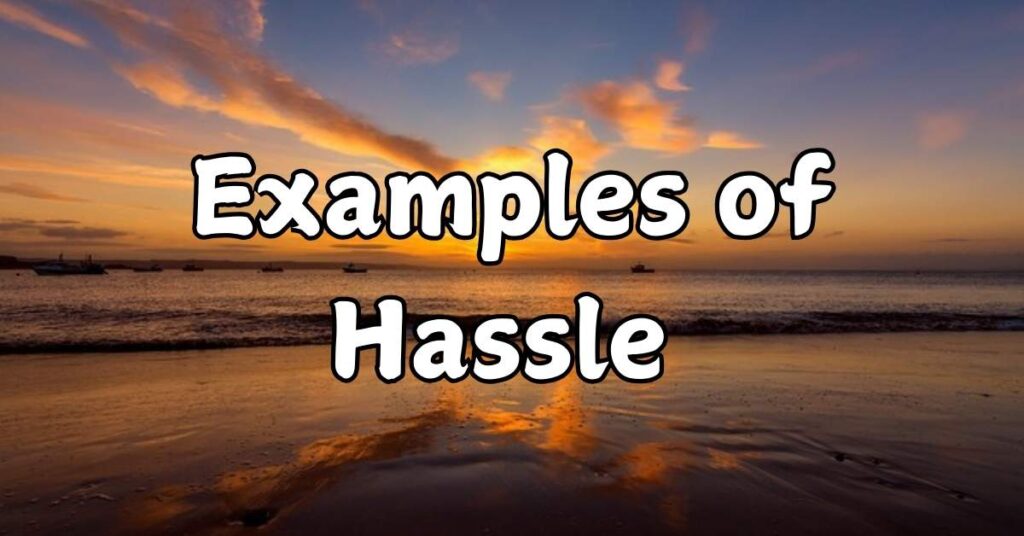
Hassle appears in music, literature, and movies, reflecting everyday challenges and frustrations that resonate with audiences in relatable ways.
Examples In Music
- In the song “Hassle” by The Holdup, the lyrics reflect on the everyday annoyances that come with relationships, capturing the essence of dealing with life’s minor frustrations.
- Erik Hassle addresses the concept of hassle in his song “Hurtful,” where he expresses feelings of frustration and emotional turmoil, emphasizing how personal conflicts can become a hassle.
- Lou Reed features the term in his track “Street Hassle,” where he explores themes of urban life and the hassles that come with it, painting a vivid picture of struggles in the city.
Examples In Literature
- “Navigating the complexities of adult life is a constant hassle, filled with unexpected challenges.”
- A short story could describe a protagonist’s day as a series of hassles, highlighting how small annoyances can accumulate and affect one’s mood.
- “Life’s little hassles weave through my thoughts, like threads in a tapestry of chaos and calm.”
Examples In Movies
- “Office Space,” characters frequently complain about workplace hassles, showcasing the frustrations of corporate life and its impact on their well-being.
- “Ferris Bueller’s Day Off” features scenes where Ferris navigates various hassles while trying to enjoy a day off from school.
- The protagonist faces numerous hassles as he struggles to provide for his son, illustrating the challenges of poverty and perseverance.
Examples In Business
- “Implementing new software can often lead to unexpected hassles that disrupt workflow during the transition period.”
- In a marketing report, it could be noted that customer service issues often arise from product hassles, affecting overall satisfaction and retention.
- A management guide may suggest strategies for minimizing operational hassles to improve efficiency and employee morale in the workplace.
What Causes Problems with Spelling?
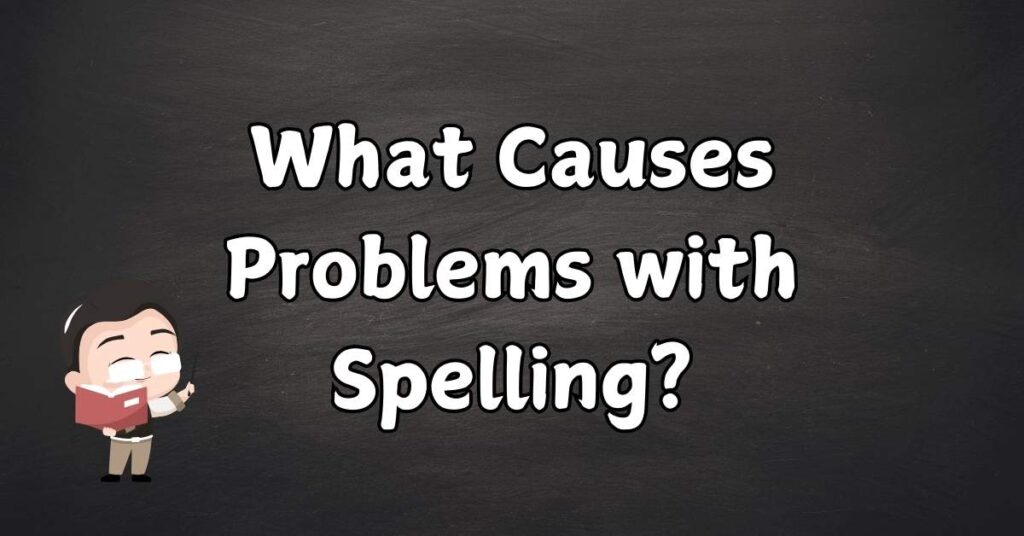
Spelling errors like using hastle instead of hassle often stem from several factors. Mispronunciations can lead people to write words incorrectly based on how they sound rather than their actual spelling.
Additionally, regional accents may influence pronunciation and contribute to confusion between similar-sounding words.
Tips to Remember the Correct Spelling: ‘Hassle’
- Use “hassle-free” to remember the correct spelling.
- Think of two ‘S’s as representing two sides of difficulty.
- Say it as “has-sle” to reinforce the sounds.
- Write “hassle” several times to reinforce memory.
- Use “hassle” in sentences to become familiar with its spelling.
Read More Article: Litre or Liter: Which One is Correct?
Conclusion
Understanding the difference between hassle or hastle is crucial for effective communication. While hassle accurately describes the annoyances and difficulties we encounter in daily life, hastle serves as a common misspelling without any recognized meaning.
By mastering the correct usage of hassle, you can enhance your writing and avoid confusion in conversations. Remembering these distinctions not only improves your language skills but also helps you navigate everyday challenges with greater clarity and confidence. Embrace the correct spelling to communicate more effectively.
FAQs: Hassle or Hastle
What does Hastle mean?
“Hastle” is a common misspelling of “hassle” and has no recognized meaning in English.
Is it hassel or a hassle?
The correct spelling is “a hassle,” which refers to an annoyance or difficulty.
Is it spelled Hussle or hustle?
The correct spelling is “hustle,” which means to move quickly or work hard, often in a business context.
What does Hassle free mean?
“Hassle-free” describes an experience that is easy and without complications or annoyances
Related Article: Usage or Useage: What’s the Difference?

